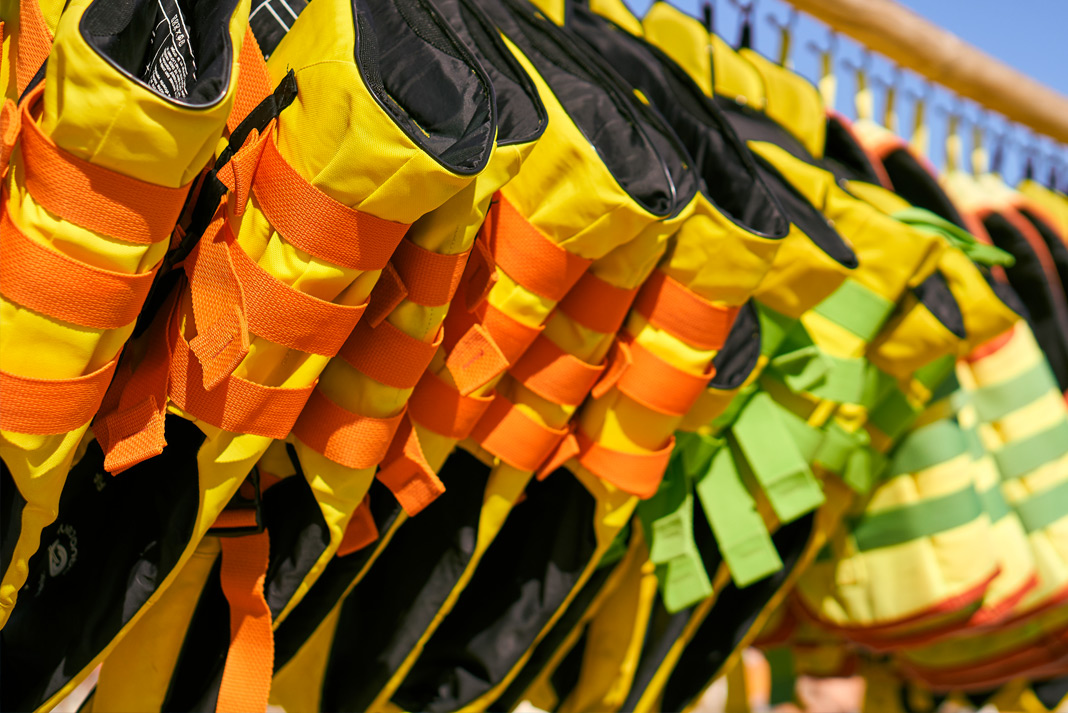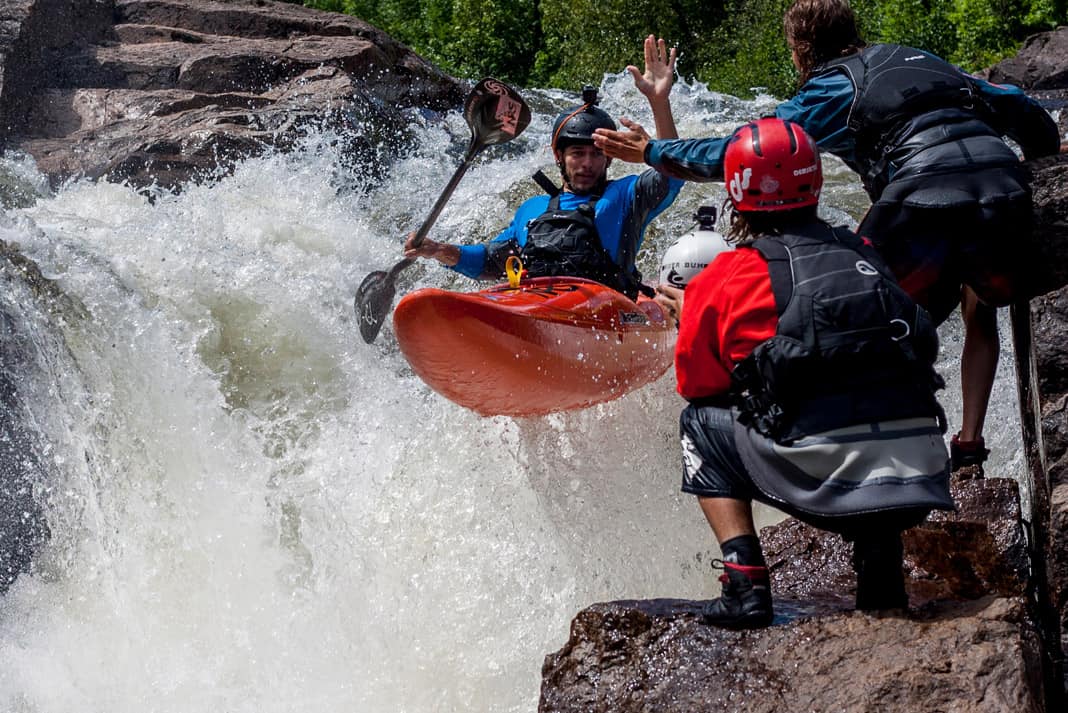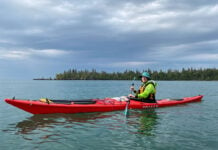Rhode Island has joined a short list of U.S. states requiring a life jacket be worn by all paddlers at all times.
On March 23, 2023, the state announced a new law that took effect in April, stating, “All operators & passengers of canoes, kayaks, sailboards, kiteboards, paddleboards, and any other paddlecraft shall wear a U.S. Coast Guard approved PFD at all times while underway regardless of age.” Paddlers not wearing a PFD may be subject to a $100 fine.
New Rhode Island Law Requires Paddlers To Always Wear PFDs
The state’s new law was motivated by the three fatal kayak incidents in 2022, as well as the state’s recognition that nearly half of its boating-related drownings occurring between 2018 and 2021 were paddlecraft users not wearing life jackets.
Rhode Island is only the second state currently requiring persons, in an all-encompassing range of paddlecraft, to be wearing a life jacket at all times, regardless of age. New Mexico was the first. A few additional states, including Pennsylvania, Connecticut and Massachusetts, have seasonal laws for all paddlers to be wearing a PFD during the colder months. It should be noted, in every U.S. state, children are required to wear a PFD while paddling, and in the vast majority of states that age consideration is 13 and under.

The Providence Journal shared the opinion of a handful of paddlers as the new law went into effect. Some felt it is an overreach by their state government, while others, including members of area paddling associations, feel it is a net positive for safety.
Most states already require a life jacket to be on board paddlecrafts, but having every paddler wear their life jacket has not broadly been enacted at the legislative level.
In the Providence Journal article, Captain Michael Schipritt, the boating safety coordinator for Rhode Island’s Department of Environmental Management’s Division of Law Enforcement, puts the difference between having and wearing as such: “There is no time to put a life jacket on before a paddling accident. It’s like trying to buckle your seat belt before a car crash.”
New law dovetails with Coast Guard campaign
Getting paddlers to put on their life jackets has long been an educational mission of the U.S. Coast Guard.
The USCG 2022 summary of statistics on recreational boating incidents states, “Where the cause of death was known, 75 percent of fatal boating incident victims drowned. Of those drowning victims with reported life jacket usage, 85 percent were not wearing a life jacket.”
Three out of every four drownings that occurred in the Coast Guard’s 2022 report were in vessels 21 feet or under, a category nearly all paddlecraft fall into. The Coast Guard also shares that in 2022, 21 percent of drownings involved a canoe or kayak.
The message the Coast Guard has resoundingly echoed over the horn is to put on a life jacket. In Rhode Island, this safety message has evolved the way of the seat belt and will now be enforced for paddlers to “click it or ticket” in their effort to make waterways safer for recreation.
Save $100—and potentially your life—by always wearing a PFD while paddling. | Feature photo: Courtesy Old Town Canoes and Kayaks










If RI is now requiring universal PFD use, will they require manufacturers step up and make them in a wider variety of sizes? I am short, heavy and female, with the usual female body parts. Nearly all PFDs do not fit. Bigger ones are too big, and smaller ones do not have enough girth to be comfortable while paddling.
The Nanny State may have opinions on what is best for adults but it has no business mandating that those opinions become law. A good education program which recommends certain safety measures can be appropriate but not ordering adults to protect themselves when it is their right to choose.
Maybe for those who object, First Responders can just say “ok we won’t bother to rescue you”
WEARING A LIFE JACKET should be left up to the paddler.
Agreed, so long as they sign a waiver so S&R doesn’t have to risk their lives to rescue them. I’m all for personal freedoms, so long as the natural consequences are assumed as an acceptable risk. I was guiding a trip once where a customer kept unzipping his PFD because he was uncomfortable. I told him after several times that if he wasn’t willing to wear his PFD properly, that was fine, but if he was injured or drowned, I’d call his wife and tell her that he was unable to follow instructions, and his body is located in a glacier basin just south of Petersburg, Alaska.
Sounds great. Now all that’s left is to require ALL first responders to be certified in river rescue. Or provide on demand hydration for heat stroke due to the wearing of life jackets in the balmy Rhode Island summer.
I’ve paddled canoe between 40 and 100 times a year for over 45 years. I’m sometimes advocating to beginners on faster streams that they should wear theirs. Other times, I’m not wearing mine, either. (I do wear it in windy conditions, waves, whitewater, and wintertime or when the water is cold.) The option to wear or not-wear a PFD should be left up to the judgement of the individual. We are not requiring covid-masks on commercial aircraft anymore, though that can negatively affect the health of other passengers. Vaccine mandates are history. Why regulate individual choice here, when there is no risk to others?
And what does it mean “under way”? If I am stopped for lunch, or to fish, I am not “under way”. Would that be exempt?
No risk to others? How many times have rescuers been hurt or killed trying to rescue someone for not wearing a PFD. Most, not most every club I belong to if you want to paddle you wear it or you don’t paddle with us. When someone takes our training class and says oh I don’t need one, the first thing we do is take them out in over their head water flip them and tell them to put on their PFD. the entire time we are splashing them and pulling on their kayak (simulating what can happen) guess what they can’t do it!
I agree with the principle of always wearing a PFD, but how is it going to be enforced?
They’re not going to get everyone, but the USCG can provide a deterrent, and here in our state, conservation wardens police it already for youth.